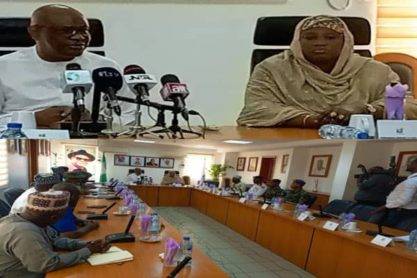Abuja, Nigeria – In response to the growing security challenges plaguing sections of the Federal Capital Territory (FCT), Minister Nyesom Wike assured the public that the FCT Administration is actively taking steps to address the escalating situation. Speaking at a press conference held on Tuesday, the minister urged residents not to panic, emphasizing that the government has implemented measures to confront the rising threats.
Wike’s reassurance comes amidst a disturbing surge in abductions and killings, particularly in the Kuje and Bwari Area Councils. Acknowledging the gravity of the situation, the minister acknowledged media coverage but sought to balance it, stating, “Yes, I am aware that sometimes too, the press overblows what is happening, but all of us are concerned and we owe a duty to make sure that FCT is safe.” He went on to highlight the commitment of the government, assuring residents that every necessary step is being taken to resolve the challenges.
Emergency Meeting with Stakeholders and Security Agencies
Prioritizing a swift response to the security crisis, Minister Wike convened an emergency closed-door meeting with key stakeholders and security agencies in the FCT. The meeting, held on the same day as the press briefing, aimed to comprehensively assess the security challenges and devise practical solutions. The minister underscored the gravity of the situation, expressing the collective responsibility shared by all stakeholders in ensuring the safety and security of the FCT.

Furthermore, Wike expanded the meeting’s participants to include the Chairmen of the six area councils. This decision was based on the understanding that local leaders play a crucial role in maintaining peace and security within their jurisdictions. The collaborative approach seeks to address the multifaceted nature of the security challenges and ensure a coordinated effort to restore peace in the affected areas. As the government takes decisive steps, residents are encouraged to remain vigilant and cooperative, with the assurance that their safety is a top priority for the FCT Administration.
Escalating Insecurity in FCT Raises Concerns About Nigeria’s Overall Security
In recent times, the Federal Capital Territory (FCT) of Nigeria has witnessed a concerning surge in insecurity, particularly in the form of kidnappings. This disturbing trend is not only causing distress among the local population but is also sending a disconcerting message to the international community. Abuja, as the capital of Nigeria, is expected to be a bastion of security and stability; however, the recent escalation in criminal activities is casting doubt on the nation’s ability to ensure the safety of its citizens.
Residents of Abuja have expressed growing fear and frustration as incidents of kidnapping become more frequent. This wave of insecurity is not only threatening the lives of individuals but is also eroding the sense of safety that should be inherent in the nation’s capital. The implications of such a deteriorating security situation in Abuja are far-reaching, potentially affecting not only the local populace but also the nation’s reputation on the global stage.
Nigeria’s Security Image on the Line

The increasing insecurity in Abuja raises serious questions about Nigeria’s overall security posture. The capital city, being a symbolic representation of the nation’s strength and stability, should ideally be a showcase of effective security measures. However, the current challenges indicate a gap that, if not promptly addressed, could have severe repercussions for the country’s image.
It is imperative for the federal government to take decisive action and prioritize the security of life and property. The adage “charity begins at home” resonates strongly in this context, emphasizing that if the capital cannot be adequately secured, the prospect of ensuring security in other parts of the country becomes questionable. A comprehensive strategy, combining law enforcement efforts, intelligence gathering, and community engagement, is crucial to restoring confidence in the security apparatus and dispelling the growing perception of Nigeria sliding into a broader security crisis.
In conclusion, the wave of insecurity in Abuja demands urgent attention, not only for the well-being of its residents but also for the sake of Nigeria’s overall security image. The federal government must address these challenges head-on, demonstrating a commitment to safeguarding the lives and property of its citizens. Only through such concerted efforts can Nigeria reverse the negative narrative and reassure both its populace and the international community of its ability to overcome security challenges and maintain stability.
Table of Contents
Discover more from OGM News NG
Subscribe to get the latest posts sent to your email.














